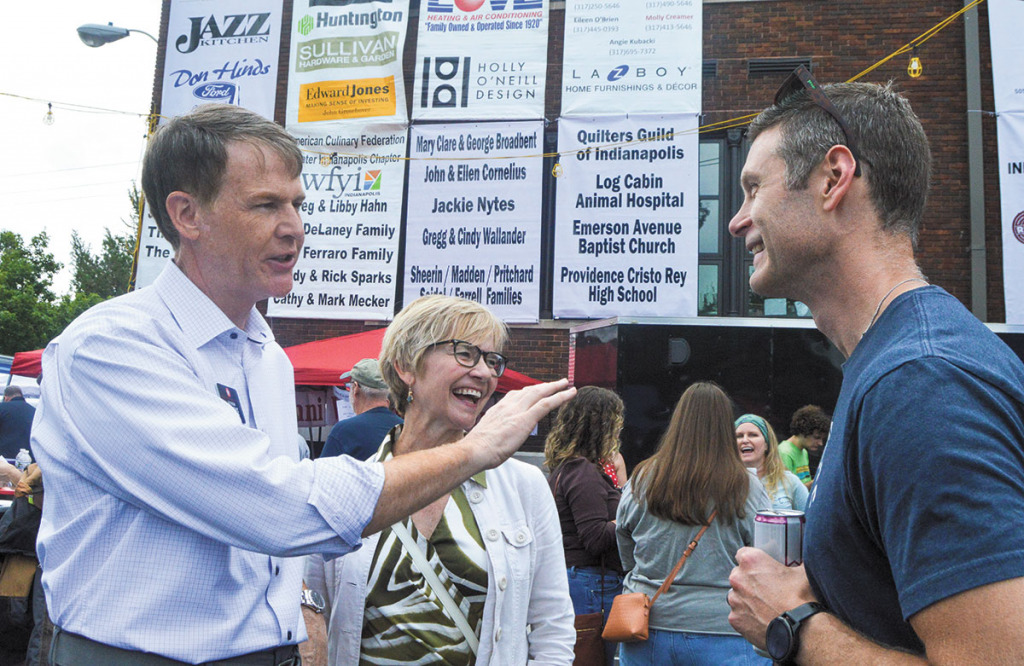Subscriber Benefit
As a subscriber you can listen to articles at work, in the car, or while you work out. Subscribe NowJust a few months ago, Jefferson Shreve was running for Indianapolis mayor. And while he fell well short in his bid to unseat Mayor Joe Hogsett, Shreve spent $13 million on the effort, much of it for television, radio and social media ads aimed at boosting his name ID.
Now, Shreve is seeking a seat in the U.S. House representing Indiana’s 6th District. And while only a small part of the district overlaps with city boundaries, most of it is within the Indianapolis television market, meaning a big chunk of the money Shreve spent last year paid for ads that reached the voters he’s courting today.
That could be a blessing and a curse for Shreve, who is facing six other candidates in the Republican primary.
The ads no doubt increased Shreve’s name recognition. But his mayor’s race messages—aimed at a mostly Democratic voting base—staked out moderate positions, including gun control measures, that might not play as well with the 6th District’s primary voters.
Experts say that’s the double-edged sword of having political experience. And Shreve isn’t alone. Four of his opponents—State Rep. Mike Speedy, state Sen. Jeff Raatz and former state lawmakers John Jacob and Bill Frazier—have run for office or served in districts that overlap at least in part with the 6th Congressional District and have voting records from their time in office.
Mike Wolf, acting director of Purdue University Fort Wayne’s Mike Downs Center for Indiana Politics, said research shows that legislative experience and previous campaigns lead to greater success in congressional races. Still, past campaign stances and votes might come back to haunt candidates.
Shreve, for example, said last year that he would seek legislative changes that let local governments set their own rules about guns, which he believed was important to allow Indianapolis to address crime and safety issues. He also supported a ban on assault weapon sales and a repeal of the state’s permitless carry rule.
His gun stance resulted in an “F” grade from the National Rifle Association—a drastic shift from a top rating he received during a 2016 run for a seat in the Indiana Senate. That F will likely hurt Shreve now that he’s running in the more conservative 6th District, Wolf said.
“I don’t think it’s going to be very positive in the end if your grade from the NRA is low,” Wolf said. “That’s going to be something that the others will hit on.”
And his opponents have done just that. In a statement touting his own “A+” rating from the NRA, Speedy said that, in Congress, “I will always stand to protect the Second Amendment, unlike Shreve, whose gun policies mirror the Democrat mayor of Indianapolis.” To drive home the point, Speedy appears in ads shooting a rifle.
Shreve’s campaign declined IBJ’s request to interview the candidate. But the Shreve campaign is taking advantage of Speedy’s record in the Legislature for one of its own ads. It accuses Speedy of voting for tax increases during his 14 years in office, a claim Speedy says misrepresents his record.
The district
For nearly six years, Republican U.S. Rep. Greg Pence has represented the 6th District. When he announced in February that he would not seek reelection, a group of established politicians and business leaders jumped into the race.
The district contains portions of Marion, Bartholomew and Randolph counties and all of Johnson, Shelby, Hancock, Delaware, Rush, Fayette, Union and Wayne counties. And although the southern portion of Marion County is a recent redistricting addition that might add some moderate or liberal voters, the district is generally conservative and hasn’t elected a Democrat since 1983.
In addition to Shreve and the four current or former legislators, the field includes Jamison Carrier, who founded Relentless Dealer Services, a recreational-vehicle-focused finance and insurance firm, and Darin Childress, a Richmond veteran who recently retired from auto mechanic work.
Shreve previously served on the Indianapolis City-County Council and founded Storage Express, a national self-storage company that he sold in 2022 for $590 million.
Chad Kinsella, director of the Bowen Center for Public Affairs at Ball State University, told IBJ the most important advantage in any crowded race without an incumbent is name recognition.
Fundraising totals and campaign spending indicate that Shreve, Speedy, Raatz and Carrier have enough money to reach voters through ads and direct mail.
According to Federal Election Commission reports covering the year’s first quarter, Shreve loaned his campaign $4.5 million. Similarly, the bulk of Speedy’s contributions came from a $1.3 million loan he gave the campaign. Speedy raised $39,465 in individual contributions, while Shreve had raised no other money.
Carrier, who lacks political experience, led the field in individual contributions at $104,180. He loaned his campaign $750,000.
Raatz reported nearly $83,000 in contributions and loaned his campaign $5,000.
“I’m not a self-funder, and so in some respects, I suppose financially I’m the underdog,” Raatz told IBJ. His contributions include support from Republican state Sens. Linda Rogers, Gary Byrne, Chris Garten and Jon Ford.
Five of the seven candidates have also been on the ballot previously for at least some of the district’s voters—although Frazier’s time in office was some 50 years ago.
Raatz hails from Richmond, in the eastern part of the district. The Indiana Senate district he represents covers almost half of the 6th Congressional District’s area; much of that part of the district is rural.
Speedy represents a more densely populated Statehouse district that covers the southeastern corner of Marion County and is within a small part of the 6th District.
But although both Raatz and Speedy have campaigned using mailers and yard signs—and sent mailers as elected officials—neither has faced a competitive challenger in years, which meant their campaigns were somewhat limited. Speedy was first elected in 2010, and Raatz was elected a few years later.
Kinsella said that, even with that experience in the district, Raatz and Speedy will need to get their names out to a larger swath of the district’s electorate. So will Jacob and Frazier, who have previously run in parts of the district, Kinsella said.
To that end, Speedy, Shreve and Carrier have spent their money on television ads to boost their name recognition.
A political past
 Shreve’s positions on gun rights and Speedy’s votes on taxes are the most glaring examples in the race of the way positions in past political service or campaigns have become issues in a race for a different office.
Shreve’s positions on gun rights and Speedy’s votes on taxes are the most glaring examples in the race of the way positions in past political service or campaigns have become issues in a race for a different office.
Although Shreve declined to be interviewed for this story, he has said he’s a gun owner and that he supports the U.S. Constitution’s Second Amendment. But during his run for mayor of Indianapolis, where crime was a significant issue in the race, Shreve advocated for some gun control measures that polls show more moderate voters—even in the Republican Party—can support.
Speedy, meanwhile, has cast hundreds of votes related to taxes. Most have been in favor of tax cuts, including measures to reduce the state’s individual income tax. But along the way, those votes have also included proposals that would have raised taxes, something the Shreve campaign is using in its ads.
Jacob served just one term—he was elected in 2020 and unseated in 2022—in the Indiana House representing the Greenwood area. He proposed a total ban on abortion as well as bills that would ban transgender care, allow adoptive and foster families to opt out of immunizations and eliminate straight-ticket voting.
Before his stint as a lawmaker, he was frequently at the Statehouse protesting abortion, sometimes donning scrubs covered in fake blood.
Kinsella, the political science professor at Ball State, said the coverage Jacob received for what sometimes seemed like extreme positions could only help him now.
“We’re in the age of former President Trump; is there really any bad publicity?” Kinsella said.
Raatz is in the middle of his third term in the Indiana Senate and will remain in the chamber if he’s unsuccessful in his congressional bid. His current term ends in 2026, when he could run for reelection. Raatz is chair of the Senate Education and Career Development Committee and has authored legislation to try to boost reading proficiency, put some restrictions on sexual education and prohibit the state from discriminating against parents based on religious beliefs.
And Frazier served one term in the Indiana Senate, from 1968 to 1970. He has lost several subsequent elections. In the 2012 GOP primary to represent Indiana’s 6th District, Frazier received just over 10% of the vote. Former U.S. Rep. Luke Messer won that primary with nearly 42% of the vote in a field of six.
Carrier has had no political experience and describes himself as an outsider in a race full of people with political experience. Still, he has raised more from donors than his opponents have.
Wolf, the Mike Downs Center leader, said that fundraising lead might be attributable in part to his outsider status in a race in which so many candidates have political experience. He said Republican voter interest in newcomers to politics began with the rise of the tea party in the late 2000s and has only intensified since, even though the tea party itself has faded from view.
Carrier’s top priority is to secure the U.S.-Mexico border to prevent drug trafficking. He lost his son, Joey, to fentanyl poisoning in 2022.
“It’s something that we don’t want other families to have to go through,” he told IBJ.
The tragic story has propelled Carrier onto national talk shows and in part earned the endorsement of former presidential candidate Vivek Ramaswamy.
And while nationalized issues like the border crisis dominate Republican concerns in polling, Wolf said Carrier’s personal narrative is particularly powerful.
Generally, 6th District voters are facing the same decisions as GOP voters across the country, Wolf said. Several incumbents, like Pence, departed their seats despite high chances of reelection due to disarray in Congress. Now voters have to decide what kind of person should fill the spot.
“Are you going to go with somebody kind of external or the more typical state legislator route?” Wolf said.•
Correction: An earlier version of this story misidentified the political affiliations of state Sens. Linda Rogers, Gary Byrne, Chris Garten and Jon Ford. They are Republicans, not Democrats. You can see all of our corrections here.
Please enable JavaScript to view this content.




Headline: “Experience plays into 6th District GOP primary”
Me: What experience? Looks like it’s all about who is more committed to Trump and MAGA than to actually solving problems facing people in the 6th district. None of these candidates have a clue.